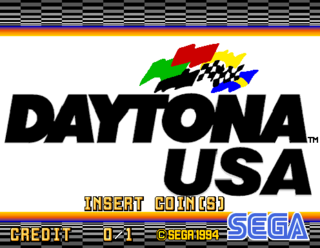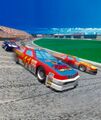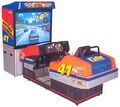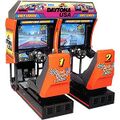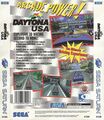Daytona USA
From Sega Retro
| Daytona USA | |||||||||||||||||||||||||||||||||||||||||||||||||||||||
|---|---|---|---|---|---|---|---|---|---|---|---|---|---|---|---|---|---|---|---|---|---|---|---|---|---|---|---|---|---|---|---|---|---|---|---|---|---|---|---|---|---|---|---|---|---|---|---|---|---|---|---|---|---|---|---|
| System(s): Sega Model 2, Sega Saturn, PlayStation 3 (PSN), Xbox Live Arcade | |||||||||||||||||||||||||||||||||||||||||||||||||||||||
| Publisher: Sega | |||||||||||||||||||||||||||||||||||||||||||||||||||||||
| Developer: Sega AM2 | |||||||||||||||||||||||||||||||||||||||||||||||||||||||
| Sound driver: SCSP/CD-DA (21 tracks) | |||||||||||||||||||||||||||||||||||||||||||||||||||||||
| Peripherals supported: Arcade Racer Joystick | |||||||||||||||||||||||||||||||||||||||||||||||||||||||
| Genre: Racing | |||||||||||||||||||||||||||||||||||||||||||||||||||||||
| Number of players: 1-8, 1 | |||||||||||||||||||||||||||||||||||||||||||||||||||||||
| |||||||||||||||||||||||||||||||||||||||||||||||||||||||
|
CERO
Missing Parameter! |
Daytona USA (デイトナUSA) is a Sega Model 2 arcade racing game developed by Sega AM2. It was initially given a limited release in Japan in 1993 to gauge public reaction to the new model hardware before its full, international release the following March.
It is loosely based on the NASCAR racing event at the Daytona International Speedway, located in real life in Daytona Beach, Florida in the United States of America. Daytona USA and all of its sequels and rereleases (except Sega Racing Classic, in which case someone else already held the arcade license) have been officially sponsored by the International Speedway Corporation.
Contents
Gameplay
The original arcade release has the player drive a stock car, known as the "Hornet" (number 41, producer Toshihiro Nagoshi's "lucky number") loosely based on a Chevrolet Beretta, racing against numerous other cars around three selectable tracks. Player one's car by default is coloured red and blue (the manual car uses a red, black and yellow colour scheme), and can be seen at the forefront of all game covers, flyers and similar media related to the series with the exception of Daytona USA 2 and its update, Daytona USA 2: Power Edition.
The game features both automatic and manual transmissions, the latter requiring use of the gear stick and which, if used properly, can lead to a faster car than the automatic. Crashing into walls or other cars can inflict damage leading to poor performance - to remedy this each level has a pit lane, which, by sacrificing some time, can fix the car.
Daytona USA has smarter AI than many other driving games from around this period. The computer analyses the player's skill during the first lap, and will instruct rival cars to move out of the way if it feels the player is doing poorly (while doing the opposite if the player registers a fast time). Most notably, however, is Daytona USA's multiplayer features. It was the first arcade game ever to allow up to eight cabinets to be linked together, with each player capable of competing in the same race. Each player assumes the roll of a different coloured Hornet, and each cabinet must be ready to race and agreed on a course before this can happen (otherwise the game may start up with less than eight players).
The game also has Team Hornet inform the player of turns and traffic, and will comment on your driving if you crash. Most of the rival teams in the game are not named, however several adopt the logos or colour schemes of Japanese car magazines, which in return wrote articles about Daytona USA[16].
Tracks
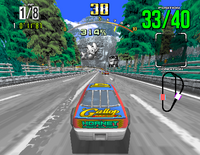
|
Three-Seven Speedway (Beginner) |
|---|---|
| The beginner track, Three-Seven Speedway (or 777 Speedway), is the simplest and most iconic track of the series, built similarly to real NASCAR tracks and is loosely based on the Pocono Speedway in Pennsylvania. It is essentially a circle, which by default has the user race 8 laps against 39 other cars. Notable features include a cliff face with Sonic the Hedgehog ingraved into the side. It is the only track in the game to offer a "rolling start". In the original Model 2 version of the game, tracks were not given names. It was only subsequent ports (and the official Daytona USA soundtrack) which named them.
Three-Seven Speedway contains strange slot machine banners, which can be manipulated by pressing the START button. Getting three 7s will give you seven seconds of extra time, with three BARs giving you an extra five. Three cherries will give you a random amount of extra time. The game only allows you to do this once during a race, though with multiplayer games every user can trigger it. | |
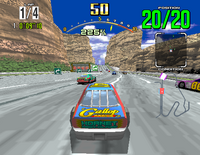
|
Dinosaur Canyon (Advanced) |
| The advanced track, Dinosaur Canyon is as expected, more challenging in nature. The number of laps required has dropped to 4, and the number of cars to 20. Both the advanced and expert tracks are designed like more traditional racing games and are not based on NASCAR tracks. They also typically require the player to make heavy use of drifting in order to get around tight corners. One of the dead-end paths from the starting position on the left leads to a sign that says "CONGRATULATIONS You Just Lost Your Sponsors!".
The music played on this track is "Let's Go Away", of which a shortened version is used as part of the attract mode. | |
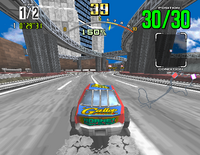
|
Sea-Side Street Galaxy (Expert) |
| The expert track, Sea-Side Street Galaxy reduces the number of laps to 2 but raises the amount of oppoents to 30. As expected it is the hardest course in game and is the only track to contain mulitple paths (aside from the pit lane).
One of the sights of this track is a statue of Jeffry, a character from Virtua Fighter. Jeffry can be turned upside down by travelling in the wrong direction for more than two laps. Coming to a stop and tapping START ( The music played here is "Sky High", also known as "Blue, Blue Skies". |
Cheats
Daytona USA has a number of strange features and hidden options.
All music can be overridden in game by holding one of the VR buttons during the "Gentlemen start your engines" screen. VR1 plays "The King of Speed", VR2 plays "Lets Go Away", VR3 plays "Sky High" and VR4 plays the secret bonus track, "Pounding Pavement". The latter can be accessed in the Saturn game by holding ![]() on this screen.
on this screen.
Interestingly you'll still get time extensions for driving around tracks in reverse. Also, if you are off-road and stopped, pressing START will return you to the track.
Time attack mode can be enabled by holding START in the transmission select screen. Also by holding VR2, VR3 and VR4 at once, a secret fifth birds eye view is enabled.
Like some of Sega's other games, giving specific initials in the results screen will trigger jingle tracks from previous Sega titles:
| NAG | Virtua Racing | MAS | ??? | GOS | ??? | MIT | ??? |
|---|---|---|---|---|---|---|---|
| ARI | ??? | YAS | Virtua Racing | DEK | ??? | OSA | ??? |
| GOM | ??? | D.K | ??? | MAC | ??? | KAG | ??? |
| MIY | ??? | KEN | ??? | H.O | Hang-On | S.H | Space Harrier |
| O.R | OutRun | A.B | After Burner | P.D | Power Drift | V.R | Virtua Racing |
| V.F | Virtua Fighter | SHO | Super Hang-On | SMG | Super Monaco GP | G.F | Galaxy Force |
| R.M | Rad Mobile | S.C | Stadium Cross | EXN | F1 Exhaust Note | S.F | Strike Fighter |
| GLC | G-Loc: Air Battle | TOR | Turbo OutRun | ORS | OutRunners | GPR | GP Rider |
| F.Z | Fantasy Zone | E.R | Enduro Racer | SDI | SDI | QTT | Quartet |
| VMO | Vermillion | T.B | Thunder Blade |
Saturn Exclusive Cheats
Karaoke mode (i.e. show the lyrics of the music in game) can be enabled by using a normal number of laps, holding ![]() and selecting a track using
and selecting a track using ![]() .
.
Maniac Mode (depicted by a small "M" in the top-left hand corner of the screen) can be enabled by entering the code ![]()
![]()
![]()
![]()
![]()
![]()
![]()
![]()
![]()
![]()
![]() . This makes the opponent cars far more faster and aggressive.
. This makes the opponent cars far more faster and aggressive.
Japanese/PAL versions of the game use kph as a measurement of speed while the US version uses mph. This can be reversed by holding ![]()
![]()
![]() on controller 2 and pressing START on controller 1.
on controller 2 and pressing START on controller 1.
By far the most interesting addition to the game is the "horse", usually seen as part of the scenery. It can either be unlocked by landing in first place on every track, or by holding ![]()
![]()
![]()
![]() and
and ![]() on the title screen, then pressing START . The "automatic" horse is brown, while the "manual" horse is grey and both can travel as fast on grass as they can on tarmac. They also cannot take damage and so can use the pit lanes like normal roads. Other cars are unlocked along the way by finishing first on certain tracks.
on the title screen, then pressing START . The "automatic" horse is brown, while the "manual" horse is grey and both can travel as fast on grass as they can on tarmac. They also cannot take damage and so can use the pit lanes like normal roads. Other cars are unlocked along the way by finishing first on certain tracks.
Saturn Mode allows you to "officially" race tracks in reverse by holding START and selecting a track with ![]() .
.
History
Development
The idea of Daytona USA was conceived during one of Toshihiro Nagoshi's visits to North America, where he went to watch a NASCAR race. At the time, his team were looking for new ways to expand and develop the racing genre, and the simplistic-yet-exciting nature of NASCAR prompted the team to try and emulate this in video game form.
The soundtrack was composed and performed by Takenobu Mitsuyoshi, however in the Model 2 version he does not sing entire songs at once. Instead parts of his vocals were recorded and played at various pitches and lengths in order to construct songs, hence their arguably simplistic nature. This is because Model 2 hardware has comparatively limited sound capabilities compared to systems which rely on CD audio.
Daytona USA's original arcade release was notable for a number of reasons. At the time, it was considered perhaps the most detailed 3D racing game ever created. Unlike Sega's previous creation Virtua Racing (released in 1992), the 3D world was fully texture-mapped, giving the impression of a more realistic world. It was also the first game to use texture filtering, allowing smoother graphics. Coupled with the graphical advances, Daytona USA is able to keep a constant full 60 FPS refresh rate, even with multiple on-screen opponents.
The 1994 worldwide arcade release has slightly better AI than the 1993 Japanese original, but is otherwise identical. Other arcade revisions of the game involve advertisements for the Sega Saturn. The deluxe cabinet version features a large 50-inch display.[17]
During development the game was originally known simply as Daytona, and then briefly as Daytona GP.
A port was planned for the Sega 32X, announced in early 1994[18], but ultimately failed to materialise.
When developing Sega Rally Championship, Sega AM3 suggested that Daytona USA was only using "50%" of the Model 2's capabilities[19].
Legacy
Due to its popularity, Daytona USA was released as a Western launch title for the Sega Saturn in 1995. This version, like the Sega Saturn itself, was rushed for a quick release and was widely criticised for its lower framerate (~20FPS) and numerous graphical concerns. This lead to Sega releasing an update; Daytona USA: Championship Circuit Edition. Like Sega Rally, this version was tuned up and offered a more stable framerate with more tracks and features.
Championship Circuit Edition would mark the first in a long line of sequels, which, with the exception of Daytona USA 2, simply took the formula of the original arcade game and "upgraded" it, rather than offering a brand new experience. Sega Racing Classic, released fifteen years after Daytona USA is even worse in this regard, as it is almost identical in nature bar some increased screen resolutions and missing Daytona branding (as another arcade company already acquired the arcade license at the time).
Versions
Saturn
Daytona USA was the second of two "big" games announced early in the development of the Sega Saturn console (the other being Virtua Fighter) and became one of the first first-party games to arrive on the platform. While ultimately Panzer Dragoon became the first Saturn released game to push texture-mapped polygons, Daytona USA was given much more coverage in the press due to its performance in the arcade scene.
However, views on the end product were mixed, with the Saturn version receiving severe cutbacks to both run relatively smoothly on the platform and meet its release date. Most notably, the game runs at only a third of the frame rate of the arcade, averaging roughly 20 frames per second. Polygon counts were lowered across the board, as was the screen resolution and texture detail, though some of this is made up with a higher quality CD audio soundtrack (Takenobu Mitsuyoshi re-recorded each song from beginning to end rather than splice clips around like in the Model 2 version). Also offered are new gameplay modes and options, such as a two-player split-screen feature.
On the Saturn, Daytona USA's draw distance is significantly shorter, meaning only scenery close to the Hornet is rendered at any given point. While not uncommon for games of the era, Daytona USA makes no attempt to hide the flaws, leading to obvious clipping and pop-in issues as geometry suddenly appears on screen (later Saturn games would use "fogging", which gives the impression that the world "fades out" when it reaches the end of the draw distance, or simply made arrangements so that the draw distance was longer). The camera is considerably more jerky in some sections of the game.
This was not seen as a good thing for the Saturn, as the PlayStation's port of Namco's Ridge Racer, released at a similar time, was neither rushed nor struggled to mask graphical concerns (it is also widely considered that the arcade version of Daytona USA is more technically advanced than the arcade version of Ridge Racer). These sorts of issues in early Saturn games gave users the impression the PlayStation was much better equipped to handle 3D worlds, which, in the west at least, was seen as the way forward for video games.
The Saturn version does include some enhancements however, such as the option to play as the other cars seen in the arcade version. It is compatible with the Arcade Racer Joystick and surprisingly, the 3D Control Pad (released a full year after Daytona USA). The game interprets the 3D Control Pad as an Arcade Racer Joystick when it is set to "analog".
PC
The Saturn version of Daytona USA was ported to Windows PCs in 1996, and offers only limited improvements over its console counterpart. By default the game does not use "true" hardware acceleration (using the Windows DirectDraw API - a 2D rendering system not always tailored for the many competing 3D accelerator cards on the market at the time), rendering an image similar to that of the Saturn (complete with "checkerboard" semi-transparency and even Saturn controllers on the car select screen), although both 320x240 and 640x480 screen resolutions are supported (the latter only affecting 3D elements, with 2D graphics such as the HUD simply being resized to fit). In both modes, draw distances, frame rate and camera transitions are similar (if not identical) to the original Saturn version.
In Japan (and possibly elsewhere), two versions of the PC port were released due to the changing nature of the PC market of the time. The first "Requires Expansion Board" version (HCJ-0110) is optimised to take advantage of the Diamond Edge 3D and Leadtek WinFast 3D GD400 video cards, while the second (HCJ-0121) utillises Microsoft's DirectX technology (and requires Windows 95). Content wise the two versions are identical.
Xbox Live Arcade/PlayStation Network
In 2011 Daytona USA was released for Xbox Live Arcade and PlayStation Network, sporting high definition visuals and online multiplayer. It is otherwise identical to the original Model 2 version, containing similar low-polygon graphics (with improved draw distances) and music (a remixed set is also available).
Downloadable content
| Title and description | Links | Releases |
|---|---|---|
Car 1 Avatar/Orange Car Avatar PlayStation Plus exclusive in the US. |
||
Car 2 Avatar/Red Car Avatar PlayStation Plus exclusive in the US. |
||
Pixel Car 1 Avatar/Red Pixel Avatar PlayStation Plus exclusive in the US. |
||
Pixel Car 2 Avatar/Yellow Pixel Avatar PlayStation Plus exclusive in the US. |
||
Pixel Car 3 Avatar/Green Pixel Avatar PlayStation Plus exclusive in the US. |
||
Daytona USA Theme PlayStation Plus exclusive. |
|
|
Daytona USA Retro Theme
|
|
Production credits
Arcade version
- Sound Composer: Takenobu Mitsuyoshi, David Leytze
- Planner: Yukinobu Arikawa, Makoto Osaki
- Programmers: Kouki Koiwa, Daichi Katagiri, Hideomi Miyauchi, Masahiko Kobayashi
- Designers: Yasuo Kawagoshi, Yasuko Suzuki, Takafumi Kagaya, Hiroyuki Nakagomi
- Chief Programmer: Takuji Masuda
- Chief Designer: Toshihiro Nagoshi
- Producer and Director: Toshihiro Nagoshi
- Producer: Yu Suzuki
- Special Thanks: Yu Suzuki, All Staffs of Sega R&D Dept. #4, #2
- Presented by: Sega, AM2
Saturn version
- Producer: Wallace Poulter & Gerald DeYoung
- Executive Proucer: Wayne Townsend
- Lead Test: Tracy Johnson
- Assistant Lead: Aron Drayer, Mark Paniagua, Lorne Asuncion, Howard Gipson
- Testers: Richie Hideshima, Sean Potter, Craig Drummond, Crisi Albertson, John Jansen, John Amirkhan, Gregg Vogt, Darin Johnston, Dermot Lyans, Rick Greer, Lance Nelson, Steve Wong, Kim Rogers, David Paniagua, Mike Borg, Dylan Manger, Eric Molina, Don Carmichael, Steve Bourdet
- Product Manager: Craig Ostrander
- Manual: Wendy Dinsmore
- Sega Sports: Mike Meisheid, Chris Smith, Scott Rohde, Chris Cutliff, Rosie Freeman, Kelly Ryan
- Chief Programmer: Yutaka Nishino
- Programmers: Hideya Shibazaki, Takayuki Yamaguchi, Kazuo Ohtani, Matsuhide Mizoguchi, Koue Tsukuda
- Designers: Yoshinao Asako, Youji Kato, Ryoya Yui
- Sound Engineers: Takayuki Nakamura, Takenobu Mitsuyoshi, Kazuhiko Kouchi
- Special Thanks: Keiji Okayasu, Toshihiro Nagoshi, Yu Suzuki, Joe Miller, Mike Latham, Yukimi Shimura, Toshiro Nakayama, Jef Feltman, Larry Loth, Willie Mancero, Scott Bayless, Jesse Taylor, Eric Rawlings, Mike Weiner, Blair Bullock, Mark Lindstrom, Tim Dunley and Nemer Velasquez
PlayStation Network/Xbox Live Arcade version
- Producer: Noriyuki Shimoda
- Director: Tohru Murayama
- Programmers: Hitoshi Iizawa, Takuji Masuda, Masanori Sato
- 2D Graphics Design: Hiroshi Kandou, Saori Furutani
- Planners: Yusaku Egami, Masahide Hiroike, Masataka Arai
- Sound Designers: Seiichi Hamada, Fumio Ito
- Director: Makoto Osaki
- Programmers: Hideki Tanaka, Tetsuya Sugimoto, Hajime Take, Junichi Arai
- Designers: Kazuya Morita, Yasuyuki Inomata, Ayami Hasegawa
- Sound Designers: Tatsutoshi Narita, Keisuke Tsukahara, Fumio Ito, Tomoya Koga, Seiichi Hamada, Kazuki Takagi, Yasuyuki Nagata
- Planner: Keiichi Matsunami
- Special Thanks: Hiroshi Kataoka
- Project Management: Takeshi Shimizu, Yasushi Yamashita
- Localization Support: Tatsuya Shikata, Satomi Okuma
- Asia Release Support: Saori Fukuda
- Publicity: Yasushi Nagumo, Syou Nanmoku
- Website: Mutsuhiro Fujii
- Product Test: Junichi Shimizu, Akira Nishikawa, Osamu Sato, Satoshi Kuwano, Naoki Sugiyama, Yuichi Kirihata, Mai Yoshizaki
- Special Thanks: Yoshihiro Toyao, Takahiro Otomo, Eiichiro Zento, Hayato Hirai, Atsuro Nishiki, Ikou Ishizaka
- CEO: Mike Hayes
- President/COO: Masanao Maeda
- Senior Producer: Frank Hom
- Associate Producer: Bryant Green
- Development Director: Patrick Riley
- Executive VP of Marketing and Sales: Alan Prichard
- Senior VP of Publishing and Content: Rob Lightner
- VP of Digital Business: Haruki Satomi
- Publishing Director: Katrin Darolle
- Senior Digital Brand Manager: Mai Kawaguchi
- Digital Brand Manager: Ben Harborne
- Associate Digital Campaign Manager: Hilarree Wong
- Digital Coordinator: Mia Putrino
- Public Relations Manager: Thu Nguyen
- First Party Manager: Sarah Elliot
- Assistant First Party Manager: Queenie Magasakay
- Director of Creative Services: Jen Groeling
- Media and Events Manager: Teri Higgins
- Production Manager: Mary Disbrow
- Graphic Designer: Marco Garcia
- Video Production Manager: Carl Smolka
- Assistant Video Editor: Greg Ammen
- Senior Web Producer: Shawn Storc
- Associate Web Producer: Jacqueline Lee
- Senior Flash Designer: Mike Dobbins
- Senior Web Designer: Annie Shaw
- Community Manager: Kellie Parker, Julian Mehlfeld
- Customer Support Manager: Robert Miles
- Customer Support: Evan Dombrowski
- Director of Legal: Liana Larson
- Legal Associate: Jerusha Herman
- Creative Director: Ethan Einhorn
- QA Manager: Mark Cartwright
- QA Supervisors: Shawn Dobbins, Demetrius Griffin
- QA Lead: Jason Bianchi
- QA Assistant Lead: Andrew Wong
- QA Testers: Justin Honegger, Jason Lam
- Standards Supervisor: Stephen Akana
- Standards Lead: Dan Buchman, Dimitryi Khlynin
- Standards Assistant Leads: Maxfield Atturio, Dennis De Bernardi, Tim Erbil
- Standards Testers: Jake Alejo, John Belcher, Bernard De La Torre, Robert Hamiter, Richard Hideshima, Charles Lam, Luke McLaughlin, Tony Stamer
- Text Proofreading: Inbound
- Mastering Lab Supervisor: Rey Buzon
- Mastering Lab Technician: Christopher Rilles
- Hardware Technician: Matt Ellison
- Special Thanks: Wendy Beasley, Ryan Morgan, David Martinez, Erin Fan, Ken Balough, Mad Catz Inc.
- CEO: Mike Hayes
- SVP of Production: Gary Dunn
- SVP of Marketing: Gary Knight
- Technical Director: Chris Southall
- Senior Producer: Carlie O'Connor
- Producer: Mariusz Szlanta
- Publishing Manager: Lee Harris
- SVP of Business Planning and Operations: Yusuke Suai
- Head of Business Analysis: Martin Benneyworth
- Purchasing Manager: Caroline van Venrooji
- Production Manager: Natalie Forsyth
- Head of Digital Marketing: Mike Evans
- Digital Marketing Manager: Richard Willis
- Digital PR Executive: Amy White
- Online Community Manager: Kevin Eva
- Head of Creative Services: Alison Peat
- Creative Services: Ed Bostock, Morgan Gibbons, Akane Hiraoka, Francesca Stella, Arnoud Tempelaere, Ranjan Vekaria, Jeff Webber
- Head of Legal & Business Affairs: Nicky Ormrod
- Legal Counsel: Polly Bennett
- Legal Executive: Saad Choudri
- Licensing Manager: Nivine Emeran
- Head of Development Services: Mark Le Breton
- Production Manager: Ben Howell
- Resource Manager: Ben Jackson
- Mastering and Equipment Manager: Dave Pither
- Senior Mastering Technician: Phil Adams
- Assistant Mastering Technicians: Cara Gifford-Pitcher, Michael Veness
- Project Lead: Renee Teloka
- Compliance Supervisor: Darran Wall
- Compliance Coordinators: Shiva Allari, Chris Barnett
- Compliance Senior Technician: Arron Caney, Martin Walker
- Compliance Technician: Alexander Abbott, Anthony Phillips, Chris Davidson, Paul Hann, Louis Li, Leo Paine
- Administration and Finance Coordinator: Chirs Bien
- QA Administrator: Chris Geiles
- Shift Monitors: Chris Bailey, Tony Langan
- UK Managing Director: John Clark
- UK Marketing Director: Amanda Farr
- UK Senior Product Manager: Anna Downing
- UK PR Manager: Fay Burgin, Stefan McGarry
- Head of Channel Marketing: Clare Hawkins
- International Sales Director: Alison Gould
- Head of International Sales: Simon Inch
- International Sales Administrator: Alice Jakubiak
- Managing Director: James Rebours
- Marketing Director: Henning Otto
- Product Manager: Chinh Vu
- PR Executive: Susanne Ortega
- Managing Director: Javier Fuentes
- Product Manager: Alex Fernandez
- PR Manager: Diana Radetski
- Managing Director: Jurgen Post
- Head of Marketing: Johan de Windt
- PR Manager: Roel Peeters
- Directeur General Europe du Sud: James Rebours
- Responsable Marketing: Thomas Grellier
- Chef de Profuits: Alexander Chapt
- Responsable RP: Franck Sebastien
- Attachee de Presse: Alexandra Fiore
- Managing Director: Darren Macbeth
- Marketing Manager: Gareth Gower
- Junior Product Manager: Neroli Harpur
- PR Manager: Vispi Bhopti
- PR Executive: Rebecca Charalambous
- Licensing: Catherine Kummer, Clem McDavid
- Legal: Jason Weaver, Ben Odom
- ©SEGA
Track list
Saturn version
| 1. [data track] |
|---|
| 2. Sega Logo (00:09) |
|---|
| 3. Let's Go Away (Advertise Theme) (00:57) |
|---|
| 4. Wait Coin (00:35) |
|---|
| 5. Start Your Engines (00:31) |
|---|
| 6. The King Of Speed (04:58) |
|---|
| 7. Let's Go Away (04:18) |
|---|
| 8. Sky High (04:43) |
|---|
| 9. Pounding Pavement (04:52) |
|---|
| 10. Breakdown (00:10) |
|---|
| 11. Raggin' (00:10) |
|---|
| 12. Check It Out! (00:10) |
|---|
| 13. Sweat (00:10) |
|---|
| 14. Rolling Start (00:35) |
|---|
| 15. The Dream Of Daytona (00:39) |
|---|
| 16. Can You Fly? (00:38) |
|---|
| 17. Pounding Pavement (Reprise) (00:38) |
|---|
| 18. G, A, M, E, O, V, E, R (00:10) |
|---|
| 19. David Goes To The Victory Lane (00:25) |
|---|
| 20. Let's Go Away (Karaoke) (04:17) |
|---|
| 21. Sky High (Karaoke) (04:43) |
|---|
| 22. Pounding Pavement (Karaoke) (04:48) |
|---|
Magazine articles
- Main article: Daytona USA/Magazine articles.
Promotional material
Model 2 version
Model 2 AU advert (TimeZone)
Saturn version
- Daytona USA Korean Print Ad.jpg
Saturn KR print advert
Saturn JP TV advert
Artwork
Screenshots
Model 2
- Result.png
Results
Model 2 Bootleg versions
Photo gallery
Physical scans
Model 2 version
| Sega Retro Average | ||||
|---|---|---|---|---|
|
| N/A | |
|---|---|
| Based on 0 reviews | |
| Model 2, US (deluxe) | ||||
|---|---|---|---|---|
| Model 2, US (twin) | ||||
|---|---|---|---|---|
| Model 2, JP (deluxe) | ||||
|---|---|---|---|---|
| Model 2, JP (twin) | ||||
|---|---|---|---|---|
| Model 2, UK (deluxe) | ||||
|---|---|---|---|---|
Saturn version
| 85 | |
|---|---|
| Based on 55 reviews | |
PC version
| Sega Retro Average | ||||||||||||||||||||||||||||||||||||||||||||||||||||||
|---|---|---|---|---|---|---|---|---|---|---|---|---|---|---|---|---|---|---|---|---|---|---|---|---|---|---|---|---|---|---|---|---|---|---|---|---|---|---|---|---|---|---|---|---|---|---|---|---|---|---|---|---|---|---|
|
| 75 | |
|---|---|
| Based on 10 reviews | |
| PC, US (Expert Software) |
|---|
| PC, EU |
|---|
|
| PC, TW |
|---|
|
PSN version
| Sega Retro Average | ||||
|---|---|---|---|---|
|
| N/A | |
|---|---|
| Based on 0 reviews | |
| PSN, Worldwide |
|---|
|
XBLA version
| Sega Retro Average | ||||
|---|---|---|---|---|
|
| N/A | |
|---|---|
| Based on 0 reviews | |
| XBLA, Worldwide |
|---|
|
External links
- Sega of Japan catalogue pages (Japanese): PC
- Sega of Japan PSN/XBLA version homepage (Japanese) (Offline)
- Daytona USA on Xbox Marketplace: UK, US, JP
- Daytona USA on PlayStation.com: JP, US, KR
- Daytona USA on PlayStation Store: JP, US, UK, AU, KR, TW
References
- ↑ Press release: 1995-05-19: Sega Saturn launch takes consumers and retailers by storm
- ↑ 2.0 2.1 2.2 File:GamePro US 073.pdf, page 52 Cite error: Invalid
<ref>tag; name ":File:GamePro US 073.pdf_p52" defined multiple times with different content - ↑ 3.0 3.1 File:SSM UK 01.pdf, page 95
- ↑ File:CVG UK 181.pdf, page 49
- ↑ File:UltraGamePlayers US 089.pdf, page 75
- ↑ 6.0 6.1 Press release: 1997-06-20: Sega chooses Expert Software for PC distribution agreement
- ↑ 7.0 7.1 7.2 http://blogs.sega.com/2011/10/25/daytona-usa-speeds-onto-consoles/
- ↑ File:DaytonaUSA PS3 US PSStore.png
- ↑ 9.0 9.1 http://www.jp.playstation.com:80/software/title/jp0177npjb00161_00daytonausa000000.html (Wayback Machine: 2011-10-22 12:09)
- ↑ 10.0 10.1 File:DaytonaUSA PS3 FR PSStore.png
- ↑ 11.0 11.1 File:DaytonaUSA PS3 UK PSStore.png
- ↑ 12.0 12.1 File:DaytonaUSA PS3 AU PSStore.png
- ↑ https://archive.is/gaVEG
- ↑ File:DaytonaUSA PS3 KR PSStore.png
- ↑ http://mamedb.com/game/daytona
- ↑ File:CVG UK 176.pdf, page 83
- ↑ File:EGM US 059.pdf, page 68
- ↑ File:CVG UK 150.pdf, page 32
- ↑ File:CVG UK 170.pdf, page 20
- ↑ http://archive.is/t2hAV
- ↑ 21.0 21.1 http://archive.is/owfs6
- ↑ http://archive.is/ewQd9
- ↑ http://archive.is/80N6k
- ↑ http://archive.is/FWLAx
- ↑ 25.0 25.1 http://archive.is/Cv3t6
- ↑ http://archive.is/5hmVx
- ↑ http://archive.is/CdkpK
- ↑ http://archive.is/BUBlo
- ↑ 29.0 29.1 http://archive.is/STUAQ
- ↑ http://archive.is/W4yDC
- ↑ http://archive.is/2hRG5
- ↑ http://archive.is/lmuXV
- ↑ 33.0 33.1 http://archive.is/N7Opm
- ↑ http://archive.is/tHM3t
- ↑ http://archive.is/j06SS
- ↑ http://archive.is/kK2Pd
- ↑ 37.0 37.1 http://archive.is/NwmgE
- ↑ http://archive.is/wejWQ
- ↑ http://archive.is/bOiAX
- ↑ http://archive.is/onLFt
- ↑ 41.0 41.1 http://archive.is/Meu7N
- ↑ File:Daytonausa sat us manual.pdf, page 18
- ↑ File:CVG UK 154.pdf, page 66
- ↑ 44.0 44.1 File:CDConsoles FR 07.pdf, page 102 Cite error: Invalid
<ref>tag; name ":File:CDConsoles FR 07.pdf_p102" defined multiple times with different content - ↑ 45.0 45.1 File:CVG UK 163.pdf, page 15 Cite error: Invalid
<ref>tag; name ":File:CVG UK 163.pdf_p15" defined multiple times with different content - ↑ 46.0 46.1 File:CVG UK 165.pdf, page 32 Cite error: Invalid
<ref>tag; name ":File:CVG UK 165.pdf_p32" defined multiple times with different content - ↑ 47.0 47.1 File:Edge UK 021.pdf, page 72 Cite error: Invalid
<ref>tag; name ":File:Edge UK 021.pdf_p72" defined multiple times with different content - ↑ 48.0 48.1 File:MAXIMUM UK 01.pdf, page 146 Cite error: Invalid
<ref>tag; name ":File:MAXIMUM UK 01.pdf_p146" defined multiple times with different content - ↑ 49.0 49.1 File:MeanMachinesSega32UK.pdf, page 58 Cite error: Invalid
<ref>tag; name ":File:MeanMachinesSega32UK.pdf_p58" defined multiple times with different content - ↑ 50.0 50.1 File:MeanMachinesSega35UK.pdf, page 88 Cite error: Invalid
<ref>tag; name ":File:MeanMachinesSega35UK.pdf_p88" defined multiple times with different content - ↑ 51.0 51.1 File:PlayerOne FR 055.pdf, page 60 Cite error: Invalid
<ref>tag; name ":File:PlayerOne FR 055.pdf_p60" defined multiple times with different content - ↑ File:SSM_JP_19950401_1995-04.pdf, page 106
- ↑ 53.0 53.1 Saturn no Game wa Sekai Ichi~i~i~i!: Satamaga Dokusha Race Zen Kiroku, SoftBank Publishing, page 12 Cite error: Invalid
<ref>tag; name ":File:SnGwSISDRZK Book JP.pdf_p12" defined multiple times with different content - ↑ File:UltimaGeneracion ES 03.pdf, page 69
- ↑ 55.0 55.1 File:VideoGames DE 1995-08.pdf, page 64 Cite error: Invalid
<ref>tag; name ":File:VideoGames DE 1995-08.pdf_p64" defined multiple times with different content - ↑ Alaab Alcomputtar, "" (SA; 1995-08-xx), page 74
- ↑ Consoles +, "Mai 1995" (FR; 1995-0x-xx), page 134
- ↑ Digitiser (UK) (1995-07-12)
- ↑ Electronic Entertainment, "August 1995" (US; 1995-0x-xx), page 76
- ↑ Electronic Gaming Monthly, "July 1995" (US; 1995-0x-xx), page 114
- ↑ Famitsu, "1995-04-07" (JP; 1995-03-24), page 1
- ↑ GameFan, "Volume 3, Issue 7: July 1995" (US; 1995-xx-xx), page 13
- ↑ Game Players, "Vol. 8 No. 8 August 1995" (US; 1995-0x-xx), page 40
- ↑ Games World: The Magazine, "June 1995" (UK; 1995-0x-xx), page 78
- ↑ Games World: The Magazine, "September 1995" (UK; 1995-0x-xx), page 69
- ↑ Game Informer, "July 1995" (US; 1995-0x-xx), page 52
- ↑ HiTech, "Mayo 1995" (ES; 1995-0x-xx), page 50
- ↑ Level, "5/97" (TR; 1997-xx-xx), page 1
- ↑ MAN!AC, "06/95" (DE; 1995-05-10), page 44
- ↑ MAN!AC, "08/95" (DE; 1995-07-12), page 45
- ↑ Mega, "May 1995" (UK; 1995-04-30), page 4
- ↑ Mega Force, "Mai 1995" (FR; 1995-0x-xx), page 30
- ↑ Mega Fun, "08/95" (DE; 1995-07-19), page 80
- ↑ Magazina Igrushek, "2/1995" (RU; 1995-xx-xx), page 88
- ↑ Next Generation, "July 1995" (US; 1995-06-20), page 68
- ↑ Players, "Dez 95" (BR; 1995-1x-xx), page 18
- ↑ Power Unlimited, "Jaagang 3, Jul/Aug 1995" (NL; 1995-06-28), page 42
- ↑ Saturn Fan, "1995 June" (JP; 1995-05-08), page 38
- ↑ Saturn+, "Christmas 1995" (UK; 1995-12-14), page 57
- ↑ Secret Service, "Maj 1996" (PL; 1996-05-01), page 67
- ↑ Sega Magazin, "August 1995" (DE; 1995-07-12), page 60
- ↑ Sega Magazine, "August 1995" (UK; 1995-07-13), page 58
- ↑ Sega News, "Říjen 1996" (CZ; 1996-xx-xx), page 13
- ↑ Sega Power, "June 1995" (UK; 1995-04-20), page 42
- ↑ Sega Pro, "May 1995" (UK; 1995-04-13), page 40
- ↑ Sega Pro, "September 1995" (UK; 1995-08-10), page 51
- ↑ Świat Gier Komputerowych, "9/1996" (PL; 1996-xx-xx), page 1
- ↑ Sega Megazone, "August 1995" (AU; 1995-0x-xx), page 20
- ↑ Sega Saturn Magazine, "April 1995" (JP; 1995-03-08), page 106
- ↑ Strana Igr, "" (RU; 1996-xx-xx), page 97
- ↑ Super Juegos, "Agosto 1995" (ES; 1995-0x-xx), page 50
- ↑ Todo Sega, "Agosto 1995" (ES; 1995-0x-xx), page 36
- ↑ Top Consoles, "Mai 1995" (FR; 1995-0x-xx), page 78
- ↑ Total Saturn, "Volume One Issue Four" (UK; 1996-12-29), page 21
- ↑ Ultimate Future Games, "June 1995" (UK; 1995-05-01), page 68
- ↑ Ultimate Future Games, "September 1995" (UK; 1995-08-01), page 91
- ↑ Última Generación, "Mayo 1995" (ES; 1995-0x-xx), page 66
- ↑ Video Games, "8/95" (DE; 1995-07-26), page 66
- ↑ VideoGames, "June 1995" (US; 1995-0x-xx), page 75
- ↑ File:PCGames DE 1996-12.pdf, page 92
- ↑ 101.0 101.1 File:PCTeam FR 021.pdf, page 58 Cite error: Invalid
<ref>tag; name ":File:PCTeam FR 021.pdf_p58" defined multiple times with different content - ↑ 576 KByte, "Február 1997" (HU; 1997-xx-xx), page 12
- ↑ Digitiser (UK) (1996-11-20)
- ↑ The Games Machine, "Gennaio 1997" (IT; 199x-xx-xx), page 62
- ↑ Hacker, "12/1996" (HR; 1996-xx-xx), page 17
- ↑ Intelligent Gamer, "November 1996" (US; 1996-1x-xx), page 108
- ↑ PC Action, "12/96" (DE; 1996-11-20), page 129
- ↑ PC Gamer Po Polsku, "Styczeń 1997" (PL; 1997-xx-xx), page 68
- ↑ Power Play, "11/96" (DE; 1996-10-09), page 144
- ↑ Secret Service, "Styczeń 1997" (PL; 1997-01-01), page 32
| Daytona USA series of games | |
|---|---|
| Daytona USA (1994) | Daytona USA 2: Battle on the Edge (1998) | Daytona USA 2: Power Edition (1998) | Sega Racing Classic (2009) | Daytona Championship USA (2017) | |
| Daytona USA (1995) | Daytona USA: Championship Circuit Edition (1996) | Daytona USA Circuit Edition (1997) | Daytona USA: C.C.E. NetLink Edition (1998) | |
| Daytona USA 2001 (2001) | |
| Daytona USA (199x) | Daytona USA (199x) | |
| Daytona USA (1996) | Daytona USA Deluxe (1997) | Daytona USA Deluxe Special Edition (199x) | |
| Daytona USA (2011) | |
| Daytona USA related media | |
| Daytona USA (1994) | Daytona USA Circuit Edition Original Sound Track (1997) | Daytona USA 2 Sound Tracks (1998) | Let's Go Away: The Video Game Daytona USA Anniversary Box (2009) | |
| Daytona USA Koushiki Guide Book (1994) | Sega Saturn Hisshou Hou Special: Daytona USA Kanzen Guide Book (1995) | Daytona USA Official Guide Book (1995) | Daytona USA Circuit Edition Hisshou Kouryaku Hou (1997) | Sega Saturn Hisshou Hou Special: Daytona USA Circuit Edition (1997) | Daytona USA 2 Official Guide (1998) | |
| Daytona USA CGMV (1994) | |
- Pages with broken file links
- Pages with reference errors
- 1-8 player games
- JP Saturn games
- All JP games
- US Saturn games
- All US games
- EU Saturn games
- All EU games
- BR Saturn games
- All BR games
- KR Saturn games
- All KR games
- Saturn games
- 1995 Saturn games
- All 1995 games
- Saturn racing games
- All racing games
- JP Windows PC games
- US Windows PC games
- EU Windows PC games
- TW Windows PC games
- All TW games
- PC games
- 1996 PC games
- All 1996 games
- PC racing games
- Windows PC games
- PlayStation 3 games
- Unknown year games
- Xbox 360 games
- Old content rating field
- Use romtable template
- All games
- Archived reference without original link
- Credits without reference
- Creditstable with no console field
- Track missing credits
- GalleryPrintAd file defined
- Old-style rating (cvg)
- Use magref
- Update ratings template
- 1 old ratings
- No ratings
- Old-style rating (cdconsoles)
- Old-style rating (comingsoon)
- External rating reference
- Old-style rating (edge)
- Old-style rating (ee)
- Rating without PDF source
- Old-style rating (famitsu)
- Old-style rating (famitsu r)
- Old-style rating (gamefan)
- Old-style rating (gameplayers)
- Rating without source
- Old-style rating (gamepro)
- Old-style rating (gamesmaster)
- Old-style rating (gamesworld)
- Old-style rating (gi)
- Old-style rating (hobbyconsolas)
- Old-style rating (maniac)
- Old-style rating (maximum)
- Old-style rating (mms)
- Old-style rating (playerone)
- Old-style rating (segapower)
- Old-style rating (segapro)
- Old-style rating (ssm)
- Old-style rating (ssmjp)
- Old-style rating (ssmjp r)
- Old-style rating (ufg)
- Old-style rating (ugameplayers)
- Old-style rating (ultimageneracion)
- Old-style rating (videogames)
- 30 old ratings
- Old-style rating (pcgames)
- Old-style rating (pcteam)
- Old-style rating (pp)
- 4 old ratings
- Old-style rating (eurog)
- Old-style rating (gamesradar)
- Old-style rating (opmuk)
- 3 old ratings
- Old-style rating (oxmuk)
- Daytona USA (franchise)
- 1993 Model 2 games
- Model 2 games
- Model 2 racing games
- Unreleased 32X games
